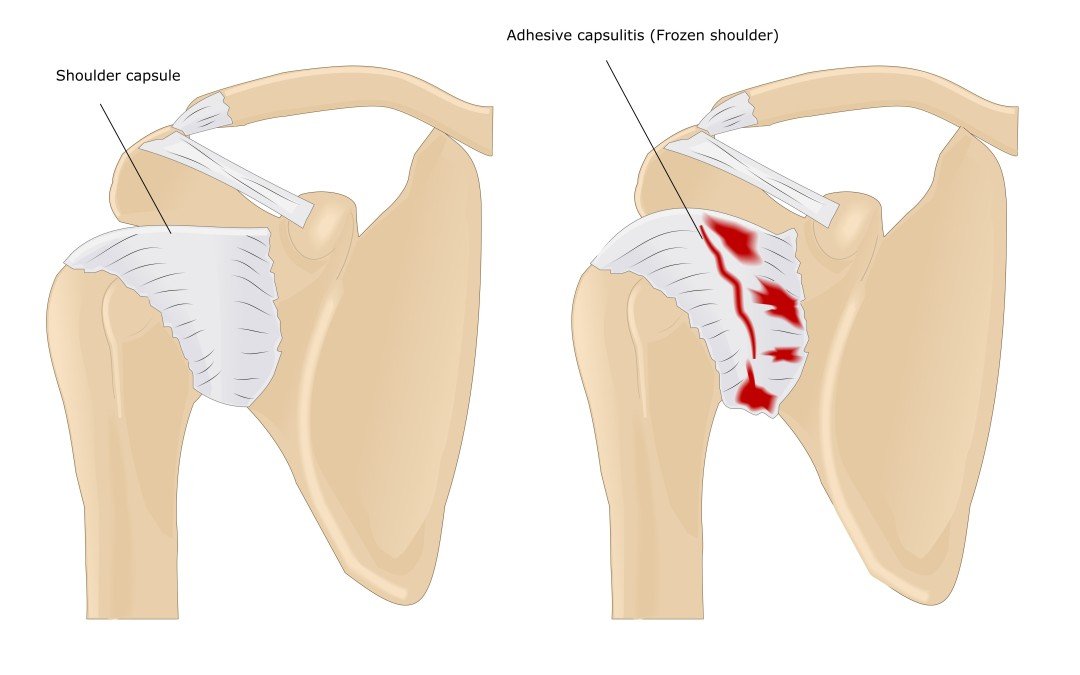Frozen Shoulder
What is frozen shoulder? Frozen shoulder or adhesive capsulitis, is a painful and restricting condition of the shoulder. Sufferers often experience dull or sharp aching pain, along with a loss of shoulder mobility. Movements that involve rotation of the shoulder become especially difficult, and this can affect everyday activities like putting on a jacket or doing up a bra strap.
The shoulder joint is a ‘ball and socket’ joint made up of three bones: the upper arm bone or humerus, the shoulder blade or scapula, and the collarbone or clavicle. The head of the upper arm bone is round in shape and makes the “ball” that fits into the “socket” that is provided by the shoulder blade. This joint is then encased with a connective tissue called the shoulder capsule. When you are affected by frozen shoulder, your shoulder capsule becomes thick and tight and can develop stiff bands called adhesions. All of this can lead to increased tension in the shoulder joint and can greatly reduce your ability to move your shoulder through its natural range of motion.

The actual cause of frozen shoulder is unknown but there are a few factors that can put you at risk:
- Gender
- Women are more likely to suffer from frozen shoulder than men
- Age
- Frozen shoulder sufferers are typically over the age of 40
- Predisposing factors
- A history of shoulder injury, trauma, surgery or long periods of shoulder immobility can increase the likelihood of developing frozen shoulder.
- Frozen shoulder is commonly associated with rotator cuff tendinitis.
The three stages of frozen shoulder:
- Freezing stage
- During the freezing stage pain levels increase while movement and overall shoulder mobility decreases.
- Frozen stage
- Pain levels may begin to decrease but shoulder mobility and range of motion worsen. Daily activities can become difficult to perform.
- Thawing stage
- The shoulder begins to “thaw”; mobility and range of motion improve.
Acupuncture for frozen shoulder
When searching for frozen shoulder treatment in Newcastle, more and more patients are turning to acupuncture for assistance. At Poke Acupuncture we use acupuncture to help relieve the pain and lost mobility experienced with frozen shoulder. Acupuncture works towards helping relieve muscular and joint restrictions of the shoulder, and helping reduce shoulder rotator cuff tendon pain and inflammation.
For any question about acupuncture for frozen shoulder or to book an appointment or a FREE 15 minute assessment click here.
Ryan Samuels
Registered Acupuncturist & Chinese Herbalist
References:
Tapper, S & Stub, T. (2011) “Acupuncture treatment of frozen shoulder. Australian Journal of Acupuncture and Chinese Medicine Vol 6.
Legge, David, Close To The Bone: The treatment of painful musculoskeletal disorders with acupuncture and other forms of Chinese medicine (Sydney college press, 3rd ed, 2011)
Learn
What to expect from your therapy or treatment.
About
Learn about our practitioners' extensive experience.
FAQs
Answers to most frequently asked questions.

Introductory Offer for New Patients
Call (02) 5590 0232 to book your FREE 15 minute assessment.



